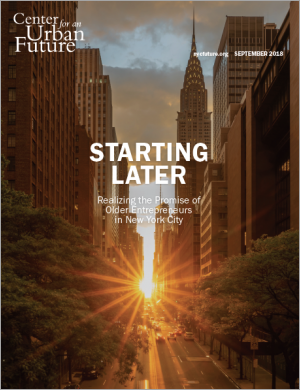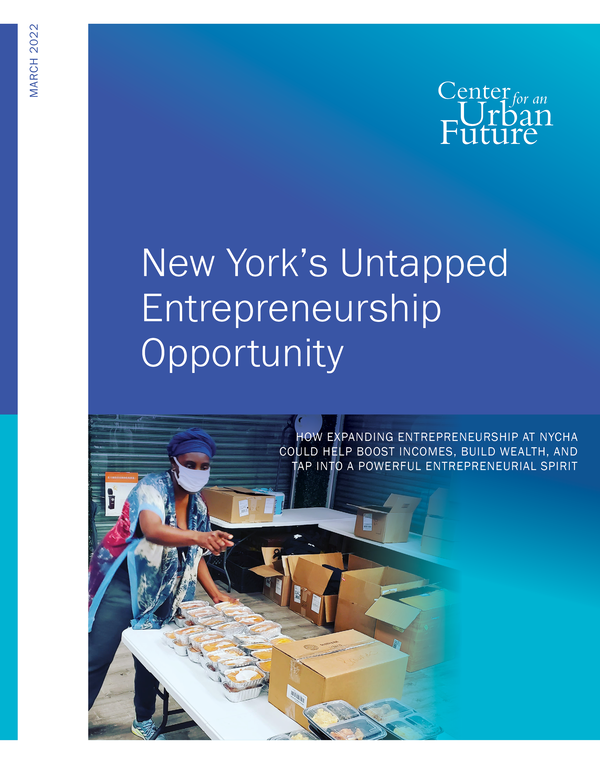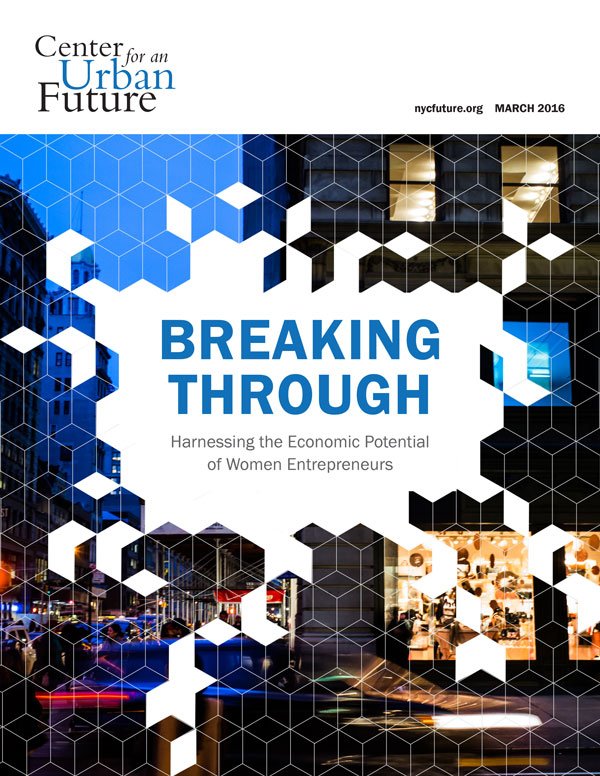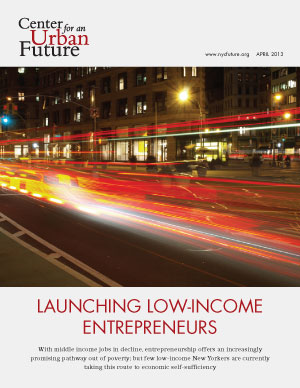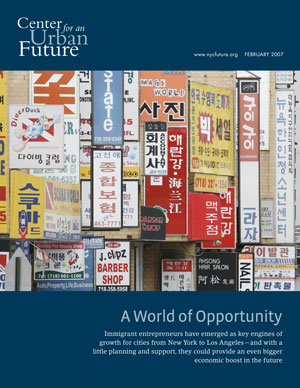- The following are recommendations from Starting Later: Realizing the Promise of Older Entrepreneurs in New York City
- Read the full report (PDF)
Today, New York City’s boomer generation amounts to nearly one-quarter of the population. By 2035, one in three New Yorkers will be over 50. They are healthier and living longer lives than any previous generation in the city’s history. Moreover, they are starting businesses at rates that exceed those of younger adults and turning to self-employment in record numbers. As the ranks of older adults swell, this demographic shift also signals the emergence of a large and growing market—one that their contemporaries know best. In the decades ahead, older New Yorkers are poised to become a much larger part of the city’s entrepreneurial ecosystem.
But most older adults face significant barriers in seeking out and exploiting entrepreneurial opportunities. Not only do very few programs serve this population, but most older New Yorkers don’t even know that entrepreneurship is a possible path for them. Those who do take the leap run into unique challenges—including risks to financial security in retirement, the digital skills gap, and a dearth of networking opportunities—all of which can limit or stymie their success. To harness the full potential of older entrepreneurs, New York City’s policymakers, nonprofit organizations, and business leaders should take several important steps to make it easier for New Yorkers over 50 to start and grow businesses.
Make older adults part of the city’s entrepreneurship agenda. The de Blasio administration has launched several important initiatives aimed at supporting entrepreneurship in recent years, including new incubators in a variety of sectors, resources for women entrepreneurs, and programs aimed at the city’s immigrant business owners. It’s time to make encore entrepreneurs the next step forward for the city’s entrepreneurship agenda. The city’s economic development agencies—New York City Economic Development Corporation (NYCEDC) and Department of Small Business Services (SBS)— should launch at least one new initiative focused on helping aspiring encore entrepreneurs get their business off the ground. As they look to design at least one new program supporting older entrepreneurs, NYCEDC and SBS ought to seek input from agencies and organizations that have more expertise in working with older adults, such as AARP, LiveOn NY, the Department for the Aging (DFTA), and New York Academy of Medicine (NYAM), which manages the city’s Age-Friendly NYC initiative.
In addition to creating new resources to support older adults interested in entrepreneurship, NYCEDC and SBS should help increase awareness of the entrepreneurship resources that already exist. New York City has developed several new programs in recent years to help would-be entrepreneurs start businesses, some operated by city agencies like SBS and others operated by nonprofit organizations. Most of these programs are not targeted to specific age groups, but offer services—from financial advice to help drawing up a business plan—that could help many of the city’s aspiring first-time business owners over 50 overcome the barriers to entrepreneurship. SBS, local economic development corporations, chambers of commerce, Small Business Development Centers, and colleges can all do more to market their entrepreneurship programs to older adults, who are often unaware of the range of services provided in communities across the city. The city’s public library systems, which are already highly effective at reaching a broad audience of older adults, could also seize the opportunity to better involve older adults in existing entrepreneurship programs.
Encourage more older adults to turn to entrepreneurship. Boosting the number of encore entrepreneurs in New York will require more than just providing resources for older adults who have already started down the path of self-employment and small business ownership. The de Blasio administration should also take steps to encourage more over-50 New Yorkers to turn to entrepreneurship. Even though encore entrepreneurship is on the rise, the vast majority of older New Yorkers do not see themselves as potential entrepreneurs. That’s not surprising since many have been in the workforce for decades, and never needed to consider a path that involved starting their own businesses. But as many older adults now face different realities—including thousands who struggle to get or keep jobs, in some cases due to age discrimination, and others who are looking for opportunities to add to their earnings after retirement—there is a real opportunity to increase the number of encore entrepreneurs.
Currently, few programs in the city promote entrepreneurship as an option for older New Yorkers or raise the visibility of successful older entrepreneurs. The few existing employment programs focused on older adults are aimed at preparing candidates to re-enter the job market, rather than supporting ambitions of self-employment and entrepreneurship. The de Blasio administration should change this. As a model, NYCEDC and SBS might look to the Network for Teaching Entrepreneurship and other existing programs that “teach” or promote entrepreneurship to young adults. New city efforts to encourage and promote entrepreneurship among older adults should begin where older New Yorkers already are: institutions like local branch libraries, naturally occurring retirement communities, and the city’s 250-plus senior centers that the Department for the Aging operates throughout the city. Programs at these venues can help older adults learn about entrepreneurship in its many forms and introduce them to the growing array of supports—including small business development programs, tech skills-building workshops, networking events, microfinance organizations, and financial planning services—that can help them get started and offer ongoing support. City programs should also tap successful older entrepreneurs to help promote this potential career path.
One ready-made avenue for developing encore entrepreneurs is to incorporate entrepreneurship, microbusiness training, and self-employment guidance into workforce development programs that are targeted at older adults, both at senior centers and nonprofit organizations that focus on skills training and job placement. The city’s Age-Friendly NYC program should also consider incorporating entrepreneurship into its education initiative by teaching classes on developing a business plan, social media marketing, or software like Excel and QuickBooks.
Develop start-up competitions for aspiring encore entrepreneurs. New York City is abuzz with start-up competitions and demo events, where aspiring entrepreneurs pitch their business ideas to investors, business experts, and the media. But despite growing in popularity every year, none of these events is focused on tapping into the world of older entrepreneurs. NYCEDC should fund a series of start-up competitions in each of the five boroughs with a focus on entrepreneurs over 50. These events should aim more broadly than the tech sector to encompass food-based businesses, online businesses, and services of all kinds. NYCEDC could partner with one or more of the library systems to launch the competitions, along with community-based small business development organizations and even senior centers. New York City should also develop the first national start-up conference for older entrepreneurs. This annual event would put New York City at the forefront of this emerging opportunity while calling attention to New York City as a supportive place for encore entrepreneurs and providing a platform for the city’s homegrown businesses led by older entrepreneurs.
Launch the nation’s first public incubator for encore entrepreneurs. New York City should establish the nation’s first public incubator space specifically aimed at aspiring entrepreneurs over 50. New York can look abroad for inspiration and model a program on Israel’s Dare to Dream initiative. This program combines business development assistance and mentorship for aspiring older adults with a vibrant community of fellow encore entrepreneurs—many of whom continue to meet regularly well after their participation in the incubator. Dare to Dream also offers a model in which young business and technology students help and advise encore entrepreneurs, creating intergenerational collaboration in the process. By creating the first encore entrepreneurship incubator in the United States, New York City can send a strong signal of support to its older adult population and become a global leader in this nascent but growing field.
Increase business-focused tech training for older adults. Today, New York’s older adults are more tech savvy than ever. Many have basic computer skills and regularly use email, search the Internet, watch videos on YouTube, and FaceTime with family and friends. But these skills are only the beginning. Although a handful of organizations provide tech training to older adults, including nonprofits like Older Adults Technology Services (OATS) and the public libraries, there are few opportunities to learn more advanced tech skills that are increasingly essential for entrepreneurship. To help older New Yorkers acquire the skills they need to start and run a business, nonprofits and other training providers should add more programs aimed at teaching older adults the technology needed for business. The de Blasio administration should provide resources to support these efforts. Programs could introduce aspiring older entrepreneurs to online marketing tools and budgeting, sales tracking, and customer management software, as well as social media branding and digital design. Small business development organizations could also develop partnerships with colleges and universities to pair undergraduate tech, marketing, and design students with aspiring older entrepreneurs, providing a valuable learning experience on both sides.
Develop and expand mentorship opportunities, including intergenerational mentorship and peer mentors. A successful leap into entrepreneurship often requires a wealth of good advice, whether it’s from lawyers, business experts, accountants, marketers, or fellow entrepreneurs. But while New York City and State boast several programs designed to connect entrepreneurs with mentors and advisors, very few of the individuals running these programs can speak from experience about the process of starting a business after age 50. Many encore entrepreneurs say that they wish they knew someone their own age who had gone through a similar experience and could help them navigate the unique challenges of starting a first business later in life. New York’s existing mentorship programs should recruit more encore entrepreneurs to join their ranks, where they can provide a powerful boost of confidence to other older New Yorkers looking to follow in their footsteps.
At the same time, some encore entrepreneurs say that what they want most in an advisor is someone with a fresh perspective, ideally a younger person who can help them catch up on new technology and think strategically about the future. The Department of Small Business Services and small business organizations can leverage the city’s entire entrepreneurial ecosystem, as well as colleges and universities, to forge these intergenerational connections, creating teams of student advisors to work with older entrepreneurs on issues like business planning, marketing, and implementing new technology.
Promote networking opportunities for aspiring encore entrepreneurs. While there are numerous networking groups and events for entrepreneurs in the city, few cater to older entrepreneurs facing life-changing decisions or to entrepreneurs who are building the kind of small, low-tech, neighborhood-based businesses typical of older founders. Networking programs directed specifically at older entrepreneurs can provide the learning, interaction, feedback and support that all entrepreneurs, whatever their age, need. As important, they allow encore entrepreneurs, many of them already short on confidence for the road ahead, to interact with like-minded people of their own generation who have had similar experiences and share the same concerns and aspirations. The city and nonprofit organizations should create and support business networks for older first-time entrepreneurs, introducing aspiring entrepreneurs to successful encore entrepreneurs to help them build confidence. In particular, the city can support more peer-to-peer events and programs that allow aspiring older entrepreneurs to meet and learn from other older entrepreneurs. A broader initiative should encourage community groups, small business programs, local development corporations, and chambers of commerce to identify potential senior entrepreneurs and feature them at meetings and other support programs. The city could also sponsor a marketing campaign for encore entrepreneurs, perhaps under the Age-Friendly New York brand, which would drive visibility of successful older adults.
Launch a program focused on supporting—and scaling up—home-based businesses. For many older entrepreneurs, the first step is a home-based business. Whether providing childcare, baking pastries, selling products online, or offering consulting services, many of these small-scale enterprises begin out of the home. To help more home-based entrepreneurs succeed, whether over 50 or under, the city should create a suite of support services aimed at their specific needs. In addition, the city should develop new efforts to help some of the many home-based entrepreneurs increase their revenues and expand beyond their homes. A first step is to offer workshops or webinars specifically geared to home-based businesses—on topics such as social media marketing, ecommerce, and legal and tax issues, for example. Further initiatives could include a grant program to cover some of the costs of moving a business from the entrepreneur’s home into a commercial space.
Develop better data on older entrepreneurs. Other than the Kauffman Foundation’s Index of Growth Entrepreneurship and GEM’s study of senior entrepreneurship globally, there is little data on the extent and character of encore entrepreneurship in the United States, much less in New York City. Building new programs and services aimed at aspiring older entrepreneurs will require a new level of data collection and analysis. New York City should lead the creation of an on-the-ground research initiative to measure the size and scope of encore entrepreneurship in New York City, identify characteristics of encore entrepreneurs, document their unique needs and challenges, and measure their impact.
Help older adults transition to self-employment after leaving the workforce. Rather than waiting until people retire or leave a job to introduce the possibility of entrepreneurship, small business development organizations should partner with employers to develop in-house entrepreneurship training programs for soon-to-be retirees, helping them identify skills and market opportunities. “We need more companies bringing entrepreneurship programs into their corporations,” says Elizabeth Isele of Senior Entrepreneurship Works. These programs could prove to be an important and competitive benefit, while introducing more working adults to the idea of entrepreneurship while they still have ample time ahead to take the plunge.
Help more older entrepreneurs make the transition from part-time to full-time self-employment. Although some older entrepreneurs are content to view their businesses as a part-time commitment, others express a desire to transition to full-time self-employment. In some cases, the challenge is finding enough clients to make freelance consulting a sustainable source of income. Others wonder if they will be able to turn a side business selling baked goods at local markets or clothing on Etsy into a full-time enterprise. To meet the needs of these aspiring full-timers, SBS, nonprofit small business development organizations, and the city’s library systems should consider developing new programs aimed at helping entrepreneurs transition from part-time to full-time self-employment, including steps for growing a freelance business and strategies for going from 10 hours per week of entrepreneurial activity to 20 or more.
Create a succession planning system to match business owners looking to retire with aspiring entrepreneurs. For successful older entrepreneurs, succession planning can pose a challenge. Without a trusted employee or family member interested in taking over the business, the prospect of choosing between closing a business or working on it in perpetuity can be a major source of stress. At the same time, many aspiring entrepreneurs over 50 are interested in taking over an existing business rather than starting one from scratch. New York City can address both the challenge and the opportunity by creating a succession planning system to match aspiring entrepreneurs with business owners seeking to retire. Modeled on a successful program in Barcelona known as Reempresa, this initiative could pair small companies looking to wind down with interested buyers through an online matching system. Participants go through an intensive business education and assistance program and the companies are vetted to ensure that they are financially sound. The result is that small businesses are sustained through a transfer to new ownership and aspiring entrepreneurs gain access to many more opportunities.

